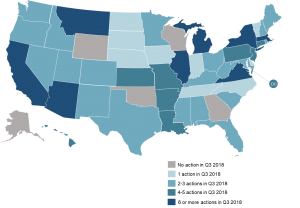The 50 States of Solar: 45 States and D.C. Took Action on Distributed Solar Policy and Rate Design During Q3 2018
Raleigh, NC – (October 24, 2018) The N.C. Clean Energy Technology Center (NCCETC) released its Q3 2018 edition of The 50 States of Solar. The quarterly series provides insights on state regulatory and legislative discussions and actions on distributed solar policy, with a focus on net metering, distributed solar valuation, community solar, residential fixed charges, residential demand and solar charges, third-party ownership, and utility-led rooftop solar programs.
The report finds that 45 states and the District of Columbia took some type of distributed solar policy action during Q3 2018 (see figure below), with the greatest number of actions relating to net metering policies, residential fixed charge or minimum bill increases, and community solar policies.
A total of 157 distributed solar policy actions were taken during Q3 2018, with the greatest number of actions taken in Arizona, California, New York, Illinois, Massachusetts, Michigan, Montana, and Virginia.
Q3 2018 Policy Action on Net Metering, Rate Design, and Solar Ownership

The report identifies three trends in solar policy activity taken in Q3 2018: (1) a resurgence in proposals for distributed generation customer fees, (2) grid planning and solar compensation discussions converging on locational value, and (3) states and utilities considering who should bear the cost of additional meters. Three utilities proposed new fees for distributed generation customers during Q3 2018, while regulators in one state approved a mandatory demand charge for residential customer-generators.
“With almost every state examining its solar policies, the level of conversation has grown deeper and more complex,” noted Brian Lips, Senior Policy Project Manager at NCCETC. “We are now seeing an increasing convergence between solar policy and grid modernization discussions, with a number of states using their distribution system planning efforts to create more fine-tuned DER compensation measures.”
The report notes the top five policy developments of Q3 2018 were:
- The Kansas Corporation Commission approving a mandatory demand charge for Westar’s residential distributed generation customers;
- Two Michigan utilities filing net metering successor implementation proposals;
- Stakeholders reaching a short-term net metering compromise in South Carolina;
- New Mexico regulators ending a standby charge for Xcel Energy’s distributed generation customers; and
- Arizona regulators approving net billing credit rates for Tucson Electric Power and UNS Electric, while denying the utilities’ distributed generation rate design proposal.
“The future of solar compensation is trending toward increasingly complex structures,” said Autumn Proudlove, lead author of the report and Senior Manager of Policy Research at NCCETC. “Some states are identifying the locational value of DERs, while others are piloting time-varying credits or considering demand and grid access charges.”
View the 50 States of Solar Q3 2018 Executive Summary
View and Purchase the 50 States of Solar Q3 2018 FULL Report
View other 50 States Reports – Solar, Grid Modernization and Electric Vehicles
ABOUT THE N.C. CLEAN ENERGY TECHNOLOGY CENTER
The N.C. Clean Energy Technology Center, as part of the College of Engineering at North Carolina State University, advances a sustainable energy economy by educating, demonstrating and providing support for clean energy technologies, practices and policies. It serves as a resource for innovative, sustainable energy technologies through technology demonstration, technical assistance, outreach and training. For more information about the N.C. Clean Energy Technology Center, visit: http://www.nccleantech.
MEDIA CONTACT: Shannon Helm, NCCETC, shannon_helm@ncsu.edu